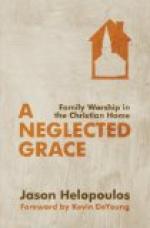Home-habits are easily formed and established. Some kind, either good or bad, are being established every day. They are often secretly and unconsciously formed. All the principles and rules of conduct there introduced become at once the nuclei of future habits. Those increase in power and supremacy as they are formed. We see this in the use of tobacco and intoxicating drink. These are, at first, disagreeable, and the victim has the power of repelling and overcoming them; but soon the habit is formed, when their use becomes pleasant, and he is made a willing slave to them.
The same may he said of the habits of industry, of study, of frugality, yea, of all the moral and religious acts of the Christian. It is easy to form such habits in children. Evil habits are more easily established, because we are naturally inclined to all evil; and when once formed, no parental interposition can break them up. Hence the importance of an early training up to good. If parents but leave their children to their own ways, they will run into evil habits; for sin is an epidemic. Profanity and falsehood and all other outrages against God will soon become the controlling habits of their lives. But when taken early, parents have complete power over their offspring. It is, therefore, a gross abuse of the Christian home when parents become indifferent to the formation of habits. It is their duty to crush every evil habit in its incipient state.
The forming of a good habit may not at first be congenial with our feelings. It may be irksome. But if we persevere in it, that which at first was painful and difficult will soon be a source of enjoyment. Thus the habit of family prayer may at first be repulsive even to the Christian parent; a feeling of delicacy and the sense of unworthiness may, at the family altar, repress the feelings of enjoyment experienced in the closet; but soon the habit of this devotion will be formed, when it will be enjoyed as an essential part of home. To abandon it would be like breaking up the tenderest ties which bind the members together. The same may be said of the omission of a duty. How easily can the Christian form the habit of omitting family prayer or any other duty! Every such omission but forms and increases the habit, until it gains an ascendancy over our sense of duty, and at last exhibits its sovereign power in our total abandonment of the duty. Each omission has the power of reproducing itself in other and more frequent omissions. In this way Christian homes insensibly become unfaithful to their high vocation, and degenerate finally into complete apathy and estrangement from God. That indulgence which the misguided sympathy of too many parents prompts to, and which does away with all parental restraint, is the cause of children coming under the curse of evil habits. In this way parents often contribute to the temporal and eternal ruin of their offspring. This indulgence is no evidence of tender love, but of parental infatuation. It shows a blind and unholy love,—a love which owns no law, which is governed by no sense of duty, and which excludes all discipline; and hence unlike the love of God, who “chastiseth every one whom He loveth and receiveth.”




